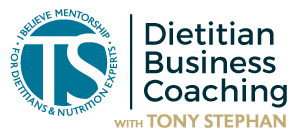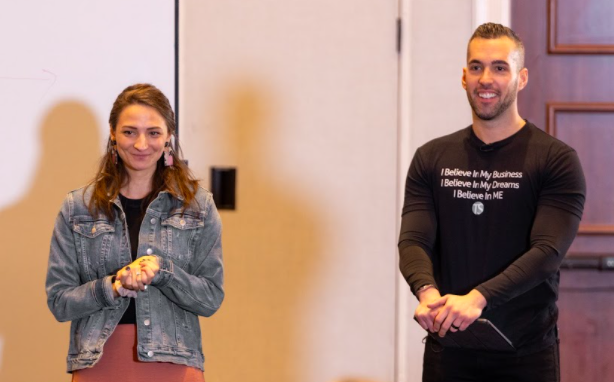Welcome back to the blog my fellow registered dietitians!
Or, if you’re new here, my name is Tony Stephan and I teach registered dietitians just like you how to create an online nutrition coaching business.
Today’s topic is something that I actually talked about this same time last year, and it was brought to my attention again so I had to share it with you.
Someone shared a video with me from the Academy of Nutrition and Dietetics president. Well, El Presidente said that registered dietitians should NOT be calling ourselves coaches.
I completely, 100,000% disagree with that. And here’s why.
I made my name in personal training before I became a registered dietitian, and obviously now I teach dietitians how to be online nutrition coaches. I’m the founder of the Dietitian Nutrition Coaching Certification, so obviously i’m a big believer in this.
So why do I think she’s wrong and what do you need to know?
With the way our field is moving, where it’s headed, and how it’s evolving into 2021, I know that education is NOT enough. What do I mean by this?
Education is free on the internet
Think about all the resources that exist for your clients: Websites, blogs just like this, YouTube videos, Instagram, Pinterest. Information is FREE on the internet.
But what people need is not more information, they need application. They NEED to know and they need to learn how they can take that information you’re giving them (macros, flexible dieting, intuitive eating) and how to take nutrition philosophies and actually apply it into their life.
The reason why our society is so unhealthy, and statistically getting unhealthier with time, is because we are bombarded with information but we don’t have application.
Our end users, our clients, our prospective clients, do not know how to apply it in their life. Anyone can just throw information at a client. This is what we’re taught to do in a clinical setting. We’re taught in a clinical setting to just throw information at people, throw handouts, throw pamphlets, and throw documents at clients. But what about retention?
What about results?
This is NOTHING against clinical dietitians, I have complete respect! But these results are not measured. It’s not “Hey, where’s my client going to be in the next 3 months, 6 months, 9 months, or 1 year from now with this information I provided them?”
It’s just giving as much information as you can and then leave and go to the next patient. That doesn’t work.
COACHING is about addressing all of the things that go on in a client’s life.
When your clients eat food, you understand they don’t just think “Oh this is 20 grams of protein, 5 grams of carbs, 3 grams of fiber.” No! They’re like “My boss stressed me out today, my boss is a jerk, I should be eating a balanced meal, but instead I’m going to go with chocolate and wine” because that’s what feels good to them!
You can’t separate the physiology from the psychology when it comes to nutrition. You absolutely HAVE to be a coach too!
If you just think you’re going to be a registered dietitian, put all your credentials after your name, go throw nutrition advice at people and hope and pray they stick to it, it doesn’t work that way.
You have to be a coach. You have to use coaching psychology. You have to understand human psychology and know how to connect the knowing what to do with nutrition to actually doing it.
That’s where coaching comes into play.
So, I disagree with the president of the academy. No disrespect whatsoever, but that’s just what I’ve learned from years and years, over a decade in the trenches of experiences with nutrition coaching.
What do good dietitians do as coaches?
Of course, at some point, you will need to educate your clients along their journey with you. But don’t just tell them WHAT to do. Tell them WHY they are doing it. If you’re increasing your clients kcals, explain the science behind it, in a way that THEY can understand. They didn’t go to school for nutrition like you did, don’t forget that. Good coaches can take their knowledge which is in the clouds, and bring it down to the streets so their clients can connect.
You also need actionable items. Nutrition coaching needs measurable outcomes. Just telling someone to increase their protein won’t cut it. All goals should be measurable and follow the lowest hanging fruit method.
Then comes accountability. Good coaches tell you what you NEED to hear not what you WANT to hear. If you’re letting your clients off the hook with their goals when they don’t follow through, you’re not doing your job.
While doing all of this you need to speak in their language. Listen, we all learn differently. Trying to speak analytically to someone who is making decisions emotionally with food is like a Wizard hanging out with a Muggle. It just doesn’t work. Identify how your client learns and communicate to them in their language.
Lastly, make small changes. Overloading a client in the beginning is something I see happen too often with new coaches. Your goal should be to identify the”lowest hanging fruit” which is the SMALLEST change you can make with their nutrition, to produce the LARGEST outcomes. Why start small? To avoid the anxiety of overwhelm and to build MOMENTUM & CONFIDENCE for future success.
I want to hear your opinion! Do dietitians need to be coaches too or just educators?
Want to book a free 1:1 2021 business strategy call?
If so email me at tony@tonystephandietitian.com and say FREE CALL and let’s get you booked!





